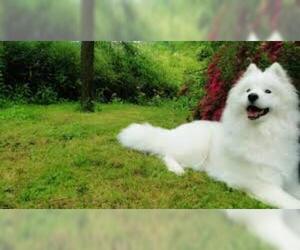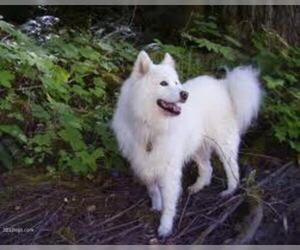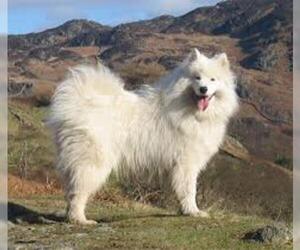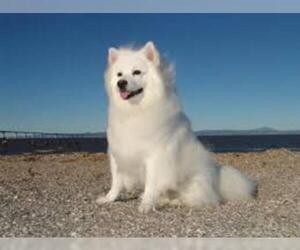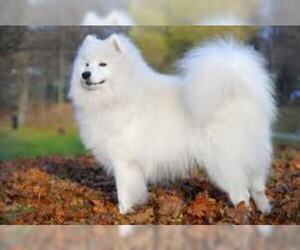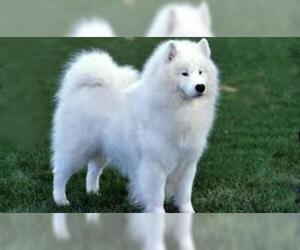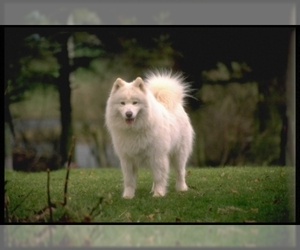
All about Samoyed dog breed
A.K.A. :Smiley, Sami, Sammy, Bjelkier, Nenets Herding Laika, White Siberian Dog, Samoyed Spitz, Arctic Samoyed, Samoyed dog, Russian Samoyed, Samoyede, Samedskaya Sobaka, Samoyede Laika, Samoyedka
Size
Grooming requirements
Exercise requirements
Good with other dogs
Watchdog ability
Energetic
Training requirements
Playful
Affectionate
Good with other pets
Good with children
Good with strangers
Winter
Summer
Healthiness
Protective
Life Span
| Pure Breeds | Member |
| Breeds A - Z | S |
| Breeds by Group | Northern Working |
| Breeds by Trait | Good With Kids High Stamina Dog Breeds Low Shedding |
| Overview: | The Samoyed, a stunning breed originating from the snowy plains of Siberia, is renowned for its iconic "Sammy smile" and luxurious, dense white coat. Historically bred by the Samoyede people for herding reindeer, hunting, and pulling sleds, they possess a strong, athletic build and beautiful dark, almond-shaped eyes that contrast with their pristine fur. Known for their friendly and gentle temperament, Samoyeds are incredibly social dogs that thrive on human companionship, often displaying playful and mischievous antics. They are generally excellent with children and other pets, making them a wonderful addition to active families. While their adaptability allows them to adjust to apartment living if provided with ample exercise, their high energy levels and need for mental stimulation necessitate a commitment to daily walks, playtime, and training. Potential owners should be aware of their proneness to certain health conditions like hip dysplasia, progressive retinal atrophy, and bloat. Overall, the Samoyed is a joyful, intelligent, and affectionate companion for those prepared to meet their grooming and exercise needs. |
F.A.Q.
All You Need to Know About the Samoyed Breed
The majestic Samoyed, originating from Siberia, is renowned for its iconic “Sammy smile” and thick, white double coat. These intelligent and gentle dogs possess a friendly, outgoing temperament, making them wonderful family pets that thrive on companionship. While their playful nature and love for children make them suitable for active families, their high energy levels and vocal tendencies mean they are generally not ideal for apartment living without significant exercise and mental stimulation. Owners must commit to regular, often daily, exercise, and be prepared for substantial grooming; their dense coat requires frequent brushing to prevent matting and manage shedding. Common health considerations include hip dysplasia and progressive retinal atrophy. Prospective owners should be ready for a dedicated training regimen and understand that the Samoyed is a loving, but high-maintenance, companion.Samoyed Weight: Average Size & Healthy Weight for Samoyed
The average healthy weight for an adult Samoyed is 45-65 pounds. Males typically weigh more than females.- Males: 50-65 pounds
- Females: 45-55 pounds
Curious about the Samoyed height and how tall is a Samoyed? On average, these beautiful Arctic dogs stand impressively at the shoulder, with some variation between males and females.
The average height of a Samoyed is:- Males: Typically range from 21 to 23.5 inches (approx. 53-60 cm) at the shoulder.
- Females: Generally a bit smaller, ranging from 19 to 21 inches (approx. 48-53 cm) at the shoulder.
The Samoyed colors are primarily white, cream, and biscuit (a light beige or fawn). The American Kennel Club (AKC) officially recognizes white, cream, and biscuit as acceptable coat colors, often allowing for "white and biscuit" variations. Pure white is the most iconic and highly desired color, but cream and biscuit are also traditional and beautiful.
There are no rare coat types or exotic Samoyed variations accepted by the AKC or other major kennel clubs for the Samoyed breed. The breed standard is very strict regarding color, focusing on the pure white to biscuit spectrum. Any claims of blue, lilac, merle, or chocolate Samoyed colors are misrepresentations, indicating a mixed breed, a genetic anomaly not typical of the Samoyed, or a scam. These non-standard colors are not natural to the Samoyed and are not recognized or accepted in purebred Samoyed lines.When considering a Samoyed, expect to find puppies in the classic white, cream, or biscuit shades. Be wary of breeders marketing "rare" or "exotic" colors, as this often indicates irresponsible breeding practices or a lack of understanding of the breed standard. Focusing on the AKC recognized Samoyed colors ensures you are acquiring a purebred Samoyed with the health and temperament characteristics true to the breed.The Samoyed personality is known for its friendly, gentle, and outgoing temperament, making them wonderful family companions. They are highly sociable and thrive on human interaction, forming strong loyal bonds with their families. Samoyeds are generally good with children, possessing a patient and playful nature, though supervision is always recommended with very young kids. Their pack mentality extends to other pets, and they typically get along well with other dogs and even cats if introduced properly from a young age. While adaptable, their need for companionship means they are not ideally suited for apartment living unless their exercise and mental stimulation needs are consistently met through daily walks and engagement. They crave being part of the family's activities and can become destructive if left alone for extended periods. Expect a vocal breed; they enjoy "talking" and can be prone to barking or the characteristic "Sammy smile" accompanied by a happy howl.
The Samoyed temperament is renowned for its friendly, sociable, and gentle personality traits, making them excellent companion dogs. They are deeply loyal to their families, often forming strong bonds. Samoyeds are generally good with children, displaying patience and a playful nature, though supervision is always recommended with very young children due to their size.They typically get along well with other pets, especially if introduced early and socialized properly. While known for their adaptiveness, apartment living can be challenging for a Samoyed; they thrive in homes with a yard and require significant daily exercise and mental stimulation to prevent boredom and destructive behaviors.Samoyeds are intelligent but can exhibit a stubborn streak, a common characteristic of spitz breeds, requiring consistent, positive reinforcement training. They are not overly sensitive in the timid sense, but they do crave attention and can become vocal or act out if neglected. Their natural inclination to be part of the "pack" means they dislike being left alone for extended periods. Expect a Samoyed personality that is joyful, sometimes mischievous, and always eager to be involved in family activities.
Samoyed Care: Daily Maintenance & Health TipsSamoyed care involves a commitment to their unique needs. This beautiful, fluffy breed requires consistent attention to stay happy and healthy.Grooming: Samoyeds are renowned for their thick, double coat. Expect significant shedding, especially during seasonal changes. Daily maintenance includes brushing at least 3-4 times a week, and daily during shedding season, to prevent mats and keep their coat healthy. Professional grooming every few months can also be beneficial.Exercise: Despite their size, Samoyeds are a low-energy dog breed. They enjoy moderate daily exercise, such as walks and playtime in a secure yard. While they can participate in more strenuous activities like hiking, they are not hyperactive.Dietary Considerations: Feed a high-quality, balanced diet appropriate for their age and activity level. Avoid overfeeding to prevent obesity, a common issue in the breed. Consult your vet for specific dietary recommendations.Skin & Coat Health: Samoyeds do not have wrinkles and do not typically require ear cleaning beyond basic hygiene checks. However, their dense coat can make them prone to skin issues if not properly groomed. Regular brushing helps prevent matting and allows for early detection of any skin irritations.Climate Sensitivity: Samoyeds are bred for cold climates and are sensitive to heat. They are not brachycephalic and do not have the associated breathing difficulties. However, always ensure they have access to shade and fresh water, especially during warmer months. Avoid strenuous exercise during peak heat.Common Health Concerns: Key health tips for Samoyed owners include regular vet check-ups. They are generally a healthy breed, but can be prone to hip dysplasia, progressive retinal atrophy, and certain autoimmune conditions. Dental care is crucial; brush their teeth regularly to prevent periodontal disease. Weight management is vital to prevent strain on joints and other health complications. Understanding how to care for a Samoyed proactively ensures a long, happy life for your companion.
Samoyed Activity Level: A Balanced & Energetic CompanionHow active are Samoyed? Samoyeds are a moderately active breed that thrives on regular engagement. They possess a good balance of short bursts of energy and an appreciation for long periods of rest. Don't be fooled by their fluffy appearance; these dogs were bred for working and have a strong need for physical and mental stimulation.Their typical energy levels mean they aren't hyperactive, but they aren't couch potatoes either. They require consistent, moderate exercise to stay happy and healthy. Daily exercise needs for a Samoyed typically involve at least 60-90 minutes of active time. This can be broken into several sessions throughout the day.Playtime preferences for Samoyeds often include activities like brisk walks, jogging (once fully grown and conditioned), hiking, and playing fetch. They love to be involved in family activities and enjoy games that challenge their intelligence, such as puzzle toys or training sessions. Due to their history as sled dogs, they often enjoy "pulling" games in a safe and controlled manner.It's important to note the limitations due to their brachycephalic anatomy. While Samoyeds are not considered a "true" brachycephalic breed like Bulldogs or Pugs, they do have a more moderate muzzle compared to some longer-nosed breeds. This means they are susceptible to overheating, especially in warm weather or during strenuous exercise. Always exercise your Samoyed during cooler parts of the day, provide plenty of fresh water, and watch for signs of overheating. They should never be over-exercised in hot climates.Are Samoyeds suitable for active families or low-energy households? Samoyeds are an excellent fit for active families who enjoy outdoor activities and can commit to their exercise requirements. They will thrive in environments where they are included in adventures and receive consistent attention. They are not suitable for low-energy households or individuals who cannot dedicate time to their exercise and mental stimulation. Without proper activity, Samoyeds can become bored, leading to destructive behaviors or excessive barking.
Samoyeds are not brachycephalic, so brachycephalic dog care practices are generally unnecessary. However, their heavy coat and Arctic heritage contribute to significant heat sensitivity, especially in warm climates or during vigorous activity. Providing shade, hydration, and rest breaks is essential. Spinal problems such as arthritis or degenerative disc disease may occur with age or poor conditioning, particularly in overweight dogs or those with limited mobility.
Breed Breakdown: What Experts Say About the Samoyed
I would rate the "Size" trait of the Samoyed breed at a 6 out of 10.While not miniature or toy-sized, Samoyeds are far from giant breeds. They fall squarely into the medium-to-large category. Typically, adult males stand around 21-23.5 inches at the shoulder and weigh 45-65 pounds, with females slightly smaller at 19-21 inches and 35-50 pounds. Their sturdy, muscular build and dense double coat can make them appear larger than their actual measurements, but their bone structure is not excessively heavy. Compared to breeds like Chihuahuas (1) or even Beagles (3), they are significantly larger. However, against Great Danes (10) or Mastiffs (9), they are considerably more compact. This moderate size means they are generally not ideally suited for small apartment living without significant daily exercise and mental stimulation, as they need room to stretch and play. While they can travel, their size makes them more challenging to accommodate in small car spaces or airline cabins compared to smaller breeds. Households with space constraints might find them a bit much, especially considering their activity levels and the amount of "space" their coat requires for grooming and shedding. They thrive best in homes with at least a medium-sized yard or consistent access to outdoor areas.
I would rate the Samoyed's "Grooming Requirements" a 9 out of 10.While they are generally healthy dogs without the extensive skin fold care or constant ear issues of some breeds, their magnificent double coat is a serious commitment, making them very high-maintenance in terms of grooming. The thick, plush undercoat and longer, harsher outer coat shed profusely twice a year (known as "blowing coat"), requiring daily brushing during these periods to prevent matting and manage the incredible volume of hair. Even outside of heavy shedding, they need thorough brushing several times a week to prevent mats, remove loose hair, and keep their coat healthy. Regular bathing (every 4-8 weeks) is necessary to keep their white coat clean, and drying it completely can take hours due to its density. Nail trimming and ear cleaning are standard maintenance for most dogs, but the sheer effort involved in coat care for a Samoyed significantly elevates their overall grooming needs compared to the average companion dog. They are not a breed for someone looking for an easy-care coat.
I would rate the Samoyed's "Exercise Requirements" at a 7.Samoyeds are undeniably energetic and active dogs, bred for endurance and pulling sleds in harsh conditions. This history means they are far from a "couch potato" breed. They thrive with consistent, moderate to high-intensity exercise daily. A simple walk around the block won't cut it for a healthy adult Samoyed; they need at least 60-90 minutes of vigorous activity, often broken into two sessions. This can include brisk walking, jogging, hiking, playing fetch, or even participating in dog sports like agility or canicross. Their high energy levels mean they can become bored, destructive, and even vocal if their physical and mental stimulation needs aren't met.While not brachycephalic, their thick double coat can make them prone to overheating in warm weather, so exercise needs to be adjusted accordingly, favoring cooler parts of the day. They have excellent stamina and enjoy sustained movement. They are highly intelligent and benefit from exercises that engage their minds as well as their bodies. Therefore, while they don't have the extreme, almost tireless demands of some working breeds like Border Collies, they absolutely require structured, daily routines to stay healthy, well-behaved, and mentally stimulated, making a "7" an appropriate balance between their significant needs and the even more extreme demands of some other breeds.
I would rate the Samoyed's "Watchdog Ability" at a 4.While Samoyeds are generally alert and will bark at new sounds or the arrival of unfamiliar people, their intention is rarely to deter or confront. They are quick to vocalize, often with a distinctive "woo-woo" or a series of barks, which serves as an early warning that something is amiss. However, their territorial instincts are moderate at best, and their protective drive is low. Upon encountering a stranger, a Samoyed is far more likely to approach with a wagging tail and an invitation for a pet than to show any signs of aggression or an attempt to deter. They lack the inherent suspicion and strong defensive posture that characterizes breeds effective as deterrent watchdogs. They're excellent for providing a heads-up that someone is at the door or on the property, making them capable of providing meaningful early warnings, but they are very much passive companions rather than active protectors in a home environment.
I would rate the "Good with Other Dogs" trait of the Samoyed breed a 7 out of 10.Samoyeds are generally known for their friendly and good-natured temperament, which extends to their interactions with other dogs. They were historically bred to live and work in packs, so they typically possess a natural inclination towards canine companionship. This means they often enjoy playing with other dogs and can adapt well to multi-dog households. They're generally not prone to outright aggression and tend to be quite tolerant.However, the "7" rather than a higher number acknowledges a few important nuances. While generally sociable, Samoyeds still require proper socialization from a young age to ensure they develop into well-adjusted adults around other canines. Without adequate exposure, they can sometimes be a bit reserved or overly exuberant in their greetings, which might be misunderstood by some dogs. Their playful nature, coupled with their size and strength, means that introductions to very small or fragile dogs should still be supervised, as their boisterous play could accidentally overwhelm a smaller companion. While generally not dominant, some individuals might attempt to assert themselves, especially if not consistently trained. They thrive in canine company, often enjoying the companionship, but they benefit from owners who facilitate positive interactions and continue to reinforce polite behavior around unfamiliar dogs. They're generally good at coexisting peacefully, but successful integration into a multi-dog household often involves thoughtful introductions and consistent reinforcement of good manners.
I would rate the Samoyed's "Energetic" trait as a 7 out of 10.Samoyeds are undeniably an active breed, possessing a playful spirit and a good amount of endurance, stemming from their sledding dog heritage. They thrive on physical stimulation and truly enjoy outdoor activities like hiking, jogging (with appropriate conditioning), and playing fetch. They are certainly not laid-back or couch potato dogs, and a lack of exercise can lead to boredom and potential destructive behaviors. Their exuberance for life and desire to be involved in family activities often translates into a visible energetic demeanor.However, while active, they generally don't reach the relentless, high-octane energy levels of breeds like Border Collies or Jack Russell Terriers, which might warrant an 8 or 9. Their brachycephalic anatomy, while not as pronounced as some other breeds, can slightly affect their stamina and exercise tolerance, especially in hot weather. While they are enthusiastic and capable, prolonged intense exercise in adverse conditions should be approached with caution to prevent overheating or respiratory distress. They are naturally active and require consistent exercise to be happy and well-adjusted, but their energy typically has a good "off switch" once their needs are met, making them energetic but not perpetually wired.
I would rate the training requirements of the Samoyed at a 7 out of 10.Samoyeds are intelligent dogs, but their intelligence is often paired with a significant independent streak and a strong will, which can translate into stubbornness. They possess a moderate attention span, especially as puppies, and can be easily distracted by their surroundings – a legacy of their working breed roots where they needed to make decisions independently. While they are generally responsive to commands when they understand the "why" and are motivated, their desire to please is often secondary to their own inclinations. Consistency is absolutely paramount with a Samoyed; any lapse will likely be exploited, and they'll quickly revert to learned behaviors or test boundaries. Positive reinforcement, particularly with high-value treats and praise, is highly effective, as they respond poorly to harsh corrections.This makes them not entirely beginner-friendly and often requires experienced handling and structured routines. While a determined and consistent first-time owner can succeed, a Samoyed will challenge an owner who isn't prepared for their independent nature and the need for ongoing mental stimulation and training. Their charming "Sammy smile" can often mask a clever mind always looking for an advantage.
I would rate the Samoyed's "Playful" trait a 9 out of 10.Samoyeds are renowned for their eternally youthful spirit and boundless enthusiasm. They are far from inactive, possessing a naturally spirited disposition that manifests in a deep love for games and interaction. A Samoyed will readily engage in fetch, chase, and tug-of-war, often initiating playtime themselves with a characteristic "Sammy smile." They are not typically attention-seeking in an obnoxious way, but rather in an endearing manner, often bringing toys to their owners or nudging for a game. Their response to toys and playtime is incredibly positive, often accompanied by happy barks, tail wags, and playful nips. Overall enthusiasm in daily life is high; even everyday activities can be approached with a joyful, playful attitude. Compared to many other companion dogs, they are definitely on the more energetic and fun-loving side, maintaining a puppy-like demeanor well into adulthood. While they can have their calm moments, their underlying nature is distinctly geared towards joyful engagement.
I'd rate the Samoyed's "Affectionate" trait a solid 9 out of 10.Samoyeds are renowned for their incredibly loving and people-oriented nature. They possess an intense desire for human companionship and truly thrive on being part of the family. While they may not always be lap dogs due to their size, they are very physically close and will often lean on you, rest their head on your lap, or lie nearby. Their loyalty is unwavering, and they are highly sensitive to their owner's emotions, often offering comfort or mirroring your mood. A quintessential Samoyed behavior is their "Sammy smile," which often seems to be directly correlated with their joy in their human companions. They are classic "velcro dogs," tending to follow their family members from room to room, preferring to be in the same space as their loved ones. Compared to many other companion breeds, they are not independent; in fact, they often struggle with being left alone for extended periods because their need for affection and interaction is so strong. They absolutely thrive on affection and become deeply bonded with their human pack.
I would rate the "Good with Other Pets" trait of the Samoyed breed a 7 out of 10.Samoyeds are generally known for their friendly and good-natured temperament, which extends to other animals if properly socialized. They are not typically aggressive and often enjoy the company of other dogs, especially if raised with them. Their herding heritage means they often have a desire for a "pack" and can integrate well into a multi-dog household.However, the "7" rather than a higher score accounts for a few nuances. While not extremely high, Samoyeds do possess a moderate prey drive due to their Spitz origins. This can manifest particularly with smaller, fast-moving animals like cats or rabbits, especially if not introduced and supervised from a young age. Early and consistent socialization is key to mitigating this instinct. They are not naturally born to be entirely indifferent to these smaller creatures, and some individuals will require more dedicated training and management to coexist peacefully, particularly with felines. Resource guarding is generally not a prominent trait in the breed, but as with any dog, it can develop if not addressed through training and management. Their adaptable and generally easygoing nature makes them good candidates for multi-pet households, but their natural instincts, particularly prey drive, necessitate responsible ownership, including thorough introductions, consistent training, and ongoing supervision, especially initially. They thrive on companionship and are quite sociable, but this sociability doesn't automatically equate to complete compatibility with all other species without effort from their human companions.
I'd rate the Samoyed's "Good with Children" trait a strong 9 out of 10. They are exceptionally child-friendly, naturally possessing a gentle, patient, and affectionate temperament that makes them wonderful family companions. Samoyeds are known for their playful nature, often enjoying games and interaction with children. Their high tolerance for noise and handling, coupled with a generally good-natured disposition, means they can handle the exuberance of kids without becoming stressed or reactive. While their herding instincts might lead to some gentle "nipping" or nudging of running children (which is easily manageable with supervision and redirection), they are not aggressive. They thrive on being part of a family and generally don't require extensive training to be good with kids, though early socialization and teaching both children and the dog appropriate interactions will always enhance their compatibility.
I'd rate the Samoyed's "Good with Strangers" trait a 9 out of 10.Samoyeds are renowned for their incredibly sociable and welcoming nature, especially towards unfamiliar adults. They are a naturally outgoing breed, often described as having an "ever-smiling" disposition that extends to everyone they meet. Their historical role as working dogs living closely with people, even in the severe Arctic, fostered a strong inclination towards companionship and a lack of suspicion. They rarely exhibit guarding or aggressive behaviors towards strangers; instead, their typical response is to approach with wagging tails, seeking attention and affection. While early socialization is beneficial for any dog, a Samoyed's inherent friendliness means they usually require minimal specific training to be comfortable with new people. They adapt very well to public and guest-filled environments, often thriving on the attention and interaction they receive. While they might bark to announce an arrival, it's typically a greeting rather than a warning, and they're quick to make friends.
I would rate the Samoyed's winter tolerance as a 9.Samoyeds possess an exceptional ability to thrive in cold weather, thanks to their incredibly thick, double-layered coat. The dense undercoat provides superior insulation, while the longer guard hairs are water-repellent, shedding snow and ice. They have a moderate body fat percentage and a robust build, which further contributes to their resilience. Their well-proportioned muzzle, as opposed to brachycephalic anatomy, allows for efficient warming of inhaled air, minimizing the risk of respiratory issues in extreme cold. The risk of hypothermia is significantly lower in Samoyeds compared to many other breeds, even in very low temperatures, as long as they are active and not subjected to prolonged periods of inactivity in harsh conditions. They are bred for pulling sleds in arctic environments and genuinely enjoy outdoor activity in cold climates, often becoming more energetic and playful. Compared to most other companion dogs, Samoyeds generally *do not* require special care to keep them warm in winter; in fact, they often struggle with overheating indoors and prefer cooler environments. The special care they might need is to ensure they don't overexert themselves if temperatures are too high for their thick coats, and to provide ample opportunities for outdoor exercise in the cold, which they are built for and adore.
I would rate the Samoyed's "Summer" tolerance at a 2.This breed is highly sensitive to heat due to several factors. Samoyeds possess a thick double coat designed for frigid Arctic climates, making it incredibly difficult for them to dissipate heat effectively. While not a brachycephalic breed, their dense coat acts as a significant insulator. They are very prone to overheating and heatstroke, even in moderately warm temperatures. During summer months, their outdoor activity levels must be severely restricted to early mornings or late evenings, and only for short periods. They absolutely require climate control, such as air conditioning, during hot weather. Compared to many other companion dogs, Samoyeds require extensive special care in summer, including constant access to cool water, shaded areas, and avoidance of any strenuous activity during the day. Their inability to regulate body temperature in warm conditions puts them at a high risk for serious health issues if not meticulously managed.
I would rate the Samoyed breed's "Healthiness" trait as a 7 out of 10.Samoyeds are generally robust and resilient dogs, but they do have genetic predispositions to certain health issues that prevent them from reaching a higher rating. Their average life expectancy of 12-14 years is good, and they are not typically considered high-maintenance in terms of health compared to some brachycephalic or giant breeds. However, responsible breeding and preventive care are crucial. They can be prone to hip dysplasia, progressive retinal atrophy (PRA), diabetes mellitus, and a hereditary kidney disease called Samoyed hereditary glomerulopathy. While not as common, some individuals can also experience issues like subaortic stenosis and certain skin conditions. These potential health concerns, though often manageable with good veterinary care and responsible breeding practices to screen parent dogs, mean they aren't quite at the "exceptional health and resilience" level. They are certainly healthier than many breeds, but the presence of these known genetic issues keeps them from a perfect score.
I'd rate the "Protective" trait of the Samoyed breed as a 3 out of 10.While Samoyeds are incredibly loyal to their families and possess a distinct alertness, their protective instincts are largely limited to being excellent *watchdogs* rather than true *guard dogs*. They are quick to bark at anything out of the ordinary, and their vocal nature makes them very effective at alerting their owners to strangers or perceived threats. However, their inherent friendliness and gentle disposition mean that once a stranger is deemed non-threatening (often after a good sniff and a wagging tail), the Samoyed is more likely to seek a pat or a playful interaction than to stand their ground or offer any meaningful physical protection. They lack the aggressive territorial instincts or the bite work capabilities of breeds specifically bred for protection. Ultimately, the Samoyed is a quintessential companion dog, offering emotional support and a charming, albeit loud, early warning system.
I would rate the Samoyed's "Life Span" trait as a 7.Samoyeds are generally considered an average to slightly above-average long-lived breed compared to other companion dogs. Their average life expectancy typically ranges from 12 to 14 years, which is quite respectable. While they are prone to certain genetic health issues like hip dysplasia, progressive retinal atrophy, and a predisposition to certain cancers, responsible breeding practices help to mitigate the incidence and severity of these conditions. Good nutrition, regular exercise, and proper veterinary care also significantly contribute to a Samoyed's longevity and quality of life. They don't typically suffer from the extremely short lifespans seen in some giant breeds, nor do they reach the exceptional longevity of a few very small breeds, placing them comfortably in a healthy mid-to-high range.
Samoyed Dogs for adoptionSee all dogs for adoption
Samoyed BreedersSee all breeders
Similar Dog Breeds for Samoyed
Quick Breed Selector 0 - not important, 1 - smallest, 10 - largest
Variants & Mistakes :Samoied, Samoyd, Sammoyd, Samoyede, Samoyeds, Samoyedz, Samoieds, Samoyedog, Samoyedogs, Samoyedss, Samoyade, Samoiyd, Samoyeid, Samoyedde, Samoyedogge, Samoyeddog, Samoyedddog, Samoyedddogs, Samoyedd

